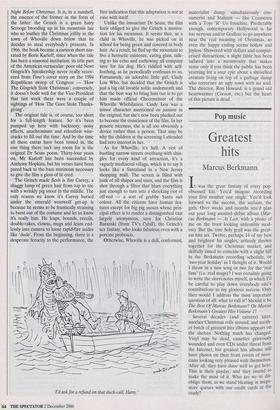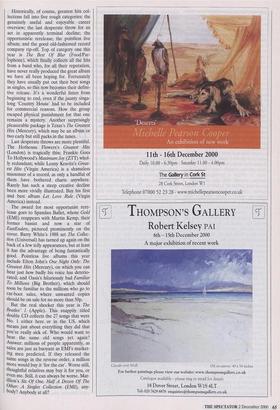Pop music
Greatest hits
Marcus Berkmann
It was the great fantasy of every pop- obsessed kid. You'd imagine recording your first number one single. You'd look forward to the success, the acclaim, the girls. Over weeks and months you'd plan out your long awaited debut album (Mar- cus Berkmann — At Last, with a photo of me on the front looking unfeasibly mod- est). But the true holy grail was the great- est hits set. Twelve, perhaps 14 of my best and brightest hit singles, artlessly thrown together for the Christmas market, and skilfully timed to coincide with a slight lull in the Berkmann recording schedule, or 'two-year holiday' as I thought of it. Would I throw in a new song or two for the 'real fans' (i.e. real mugs)? I was certainly going to write the sleevenotes myself, in which I'd be careful to play down everybody else's contributions to my glorious success. Only then would I address the most important question of all: what to call it? Should it be The Best Of Marcus Berkmann? Or Marcus Berkmann 's Greatest Hits Volume 1?
Several decades (and careers) later, another Christmas rolls around, and anoth- er batch of greatest hits albums appears on the shelves. Nothing much has changed. Vinyl may be dead, cassettes grievously wounded and even CDs under threat from the Internet, but greatest hits albums still have photos on their front covers of musi- cians looking very pleased with themselves. After all, they have done well to get here. This is their payday, and they intend to make the most of it. Who are we to dis- oblige them, as we stand bleating in mega store queues with our credit cards at the ready? Historically, of course, greatest hits col- lections fall into five rough categories: the genuinely useful and enjoyable career overview, the last desperate throw for an act in apparently terminal decline; the opportunistic rerelease; the pointless live album; and the good old-fashioned record company rip-off. Top of category one this year is The Best Of Blur (Food/Par- lophone), which finally collects all the hits from a band who, for all their reputation, have never really produced the great album we have all been hoping for. Fortunately they have usually put out their best songs as singles, so this now becomes their defini- tive release. It's a wonderful listen from beginning to end, even if the jaunty singa- long 'Country House' had to be included for commercial reasons. How the group escaped physical punishment for that one remains a mystery. Another surprisingly pleasurable package is Texas's The Greatest Hits (Mercury), which may be an album or two early but still packs in the tunes.
Last desperate throws are more plentiful. The Hothouse Flowers's Greatest Hits (London) is tragically thin; Frankie Goes To Hollywood's Maximum Joy (ZTT) whol- ly redundant; while Lenny Kravitz's Great- est Hits (Virgin America) is a shameless misnomer of a record, as only a handful of them have bothered charts anywhere. Rarely has such a steep creative decline been more vividly illustrated. Buy his first and best album Let Love Rule (Virgin America) instead.
The award for most opportunist rere- lease goes to Spandau Ballet, whose Gold (EMI) reappears with Martin Kemp, their former bassist and now a star of EastEnders, pictured prominently on the cover. Barry White's 1988 set The Collec- tion (Universal) has turned up again on the back of a few telly appearances, but at least it has the advantage of being fantastically good. Pointless live albums this year include Elton John's One Night Only: The Greatest Hits (Mercury), on which you can hear just how badly his voice has deterio- rated; and Oasis's hilariously bad Familiar To Millions (Big Brother), which should soon be familiar to the millions who go to car-boot sales, where unwanted copies Should be on sale for no more than 50p.
But the real shocker this year is The Beatles' 1 (Apple). This snappily titled double CD collects the 27 songs that were No. 1 either here or in the US, which means just about everything they did that You're really sick of. Who would want to hear the same old songs yet again? Answer: millions of people apparently, as Sales are just as buoyant as EMI's market- ing men predicted. If they released the same songs in the reverse order, a million more would buy it 'for the car'. Worse still, thoughtful relatives may buy it for you, or even me. Still, it can always be worse. Mar- ilhon's Six Of One, Half A Dozen Of The Other: A Singles Collection (EMI), any- body? Anybody at all?



















































































 Previous page
Previous page